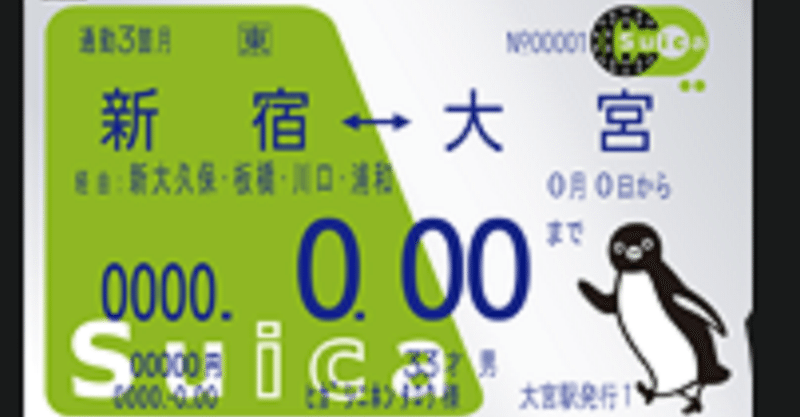
『あの病気』の感染拡大の前と後の私の生活 :その8 定期券の無い生活
去年の11月から、定期券代が支給されなくなりました。 新しい社内規定で、在宅勤務の回数に応じて、定期券を使うか、切符を買う(あるいはSuicaなどのICカード乗車券を使う)かが決まるようになったからです。
私の場合、週4回在宅勤務なので、通勤定期の代わりに回数券を使っています。3区間の回数券を買わないといけないし、回数券を入れられる改札機は少ないし、私にとって色々と不便はあります。しかし、有効期限の3か月の間に11枚を使い切るので、お得なのです。
私は、Suica定期券を使ってきたのですが、これを解約するときに、注意するべきことがありました。一言で言うと、解約する前に、Suicaの残額は0円にしておいた方がいいということです。JRのサイトでは丁寧に説明してくれています。https://www.jreast.co.jp/suica/procedure/repayment.html
「払いもどし額=カード内の残額-手数料(220円)と預り金(デポジット)
残額が1,000円のとき払いもどし額780円と、預り金500円の計1,280円返金します。
残額が100円のとき払いもどし額はありません。預り金500円のみ返金します。
残額が0円のとき払いもどし額はありません。預り金500円のみ返金します。」
これを見ていなかった私は、残額約200円を没収されてしまいました。インターネットを利用しない、あるいはできない人にとっては、不利益となる確率が高いです。
おそらく、もうすでにSuica定期券を解約した人は多いと思うのですが、今後のために書いておきます。私は、通勤用Suicaと普段使用のSuicaは分けていたので、普段使用のSuicaを解約するときのためでもあります(その時ボケていなければいいのですが)。
さて、定期券がなくなったことで、長所と短所があります。短所についてまず書きましょう。
今までは、休日、あるいは帰宅途中に定期券の範囲内で乗り降りできたのですが、それができなくなりました。図書館や、お店やデパート 、医者などに行くときには交通費がかかります。思いがけず定年後の状態になってしまいました。もっとも、一度定年退職して再雇用されている状態なので、いずれはこうなるはずでした。
図書館には、『あの病気』が流行しているため、ずっと行っていない状態です。色々な図書館に通っていたので、図書館については別途書きます。大型書店にも必ずしも行かなくて済むので、問題はありません。
歯医者については、徒歩圏内で探すことになります。
唯一、定期健診のため長年通っていた、お茶の水駅近くの眼医者には、今後も年に1回行くでしょう。
今のところは問題はありません。人の多いところにいる時間をできるだけ減らそうと思うからです。オフィスで働くときも、できるだけそこでしかできない仕事をするように工夫しています。とはいえ、行動範囲 が、家か近所だけしかないと気が滅入るので、週に一回、出勤しているのが、気分転換になっているのでしょう。
もちろん、都心に出ることで『あの病気』に感染する危険性があるので、行きたくないと思うこともあります。私は、新宿駅で乗り換えるときが一番嫌です。もしオリンピックが始まって、電車に乗る人や駅の人が増えたら、どうしようかと思います。
さて、定期券がなくなったことの長所が一つあります。「高年齢雇用継続給付金」の増額です。厚生労働省のわかりにくい説明がここにあります。https://www.mhlw.go.jp/stf/seisakunitsuite/bunya/0000158464.html
60歳以降に働き続けて、賃金が以前の75%未満になる場合、減少率によって最大で賃金の15%分が支給される、という制度です。ただし、もらえるのは65歳になるまでです。
私の場合、定期券を買わなくなってから、もらえる金額が2か月分で24千円上がりました。というのは、定期券代は、賃金として扱われているからだそうです。一方、将来もらえる年金は、その分減ると思います。
厚生年金保険料計算の元となる、標準報酬月額の対象となる報酬に、通勤手当が含まれることについては、ここに書かれています。https://www.nenkin.go.jp/faq/nteikibin/teikibinkisainaiyo/nofujokyo/20140602-03.html
ただ、その減少額が今回の増額と等しいかどうかはわかりません。私の定期代は6ヶ月で約12万円だったのですが、その金額がこのように影響するとは意外でした。年金の一部分を早めにもらえるというように解釈して、長所としました。
今は、勤務場所としての自宅と、勤め先のビルの間を往復するための交通費をもらっている、ということになります。勤務先に、25分歩いて通っていた時期もありましたが、ほとんどの期間は定期券を使っていたので、妙な気持です。『あの病気』の流行が収まってきたら、ホワイトカラーのサラリーマンの働き方はどうなるだろうか、と思うときがあります。私自身は、気力が年齢とともに弱ってきているので、通勤にエネルギーと時間を奪われないで済む働き方がちょうど合っています。
タイトル写真は、JR東日本 Suica購入方法 https://www.jreast.co.jp/suica/howtoget/ より
My life before and after the spread of "that illness": Part 8 Life without a commuter pass
Since November of last year, the commuter pass fee has stopped being paid. This is because the new company regulations now determine whether to use a commuter pass or buy a ticket (or use an IC card ticket such as Suica) depending on the number of times you work from home.
In my case, I work from home four times a week, so I use a coupon instead of a commuter pass. I have to buy coupon tickets for 3 sections, there are few ticket gates where I can put coupon tickets, and there are various inconveniences for me. However, it is a great deal because 11 cards are used up within the 3 months of the expiration date.
I have been using a Suica commuter pass, but there was something I should be aware of when canceling it. In a word, it is better to set the balance of Suica to 0 yen before canceling. The JR site explains it carefully. https://www.jreast.co.jp/suica/procedure/repayment.html
"Refund amount = balance on the card-fee (220 yen) and deposit (deposit)
If the balance is 1,000 yen, the refund amount will be 780 yen and the deposit will be 500 yen, for a total of 1,280 yen.
There is no refund amount when the balance is 100 yen. Only the deposit of 500 yen will be refunded.
There is no refund amount when the balance is 0 yen. Only the deposit of 500 yen will be refunded. "
I hadn't seen this, and the remaining amount of about 200 yen was confiscated. For those who do not or cannot use the Internet, there is a high probability that it will be disadvantageous.
Perhaps many people have already canceled their Suica commuter pass, but I will write it for future reference. I separated the Suica for commuting and the Suica for everyday use, so it is also for when I cancel the Suica for everyday use (I hope I'm not demented at that time).
Now that the commuter pass is gone, there are pros and cons. Let's write about the weaknesses first.
Until now, I was able to get on and off within the commuter pass on holidays or on my way home, but I can no longer do that. Transportation costs are incurred when going to the library, shops, department stores, doctors, etc. Unexpectedly, it has become a state after retirement. However, since I was retired and rehired, it should have happened eventually.
I haven't been to the library for a long time because "that disease" is prevalent. I went to various libraries, so I will write about the library separately. I don't have to go to a large bookstore, so there is no problem.
I will find a dentist within walking distance.
I will continue to go to the eye doctor near Ochanomizu Station, which I have been attending for many years for regular medical examinations, once a year.
There is no problem for now. This is because I want to reduce the amount of time I spend in places with a lot of people as much as possible. Even when I work in the office, I try to do the work that can only be done there. However, I feel depressed that my range of activities is limited to my home or neighborhood, so going to work once a week may be a refreshing change.
Of course, there is a risk of getting infected with "that disease" by going out to the city center, so sometimes I don't want to go. I hate changing trains at Shinjuku station. If the Olympics start and the number of people getting on the train and the number of people at the station increases, I wonder what to do.
Now, there is one advantage of having no commuter pass. This is an increase in the "aged employment continuation benefit". Here is a confusing explanation of the Ministry of Health, Labor and Welfare. https://www.mhlw.go.jp/stf/seisakunitsuite/bunya/0000158464.html
If you continue to work after the age of 60 and your wages fall below the previous 75%, you will be paid up to 15% of your wages depending on the rate of decrease. However, you can only get it until you are 65 years old.
In my case, since I stopped buying commuter passes, the amount of money I received has increased by 24,000 yen for two months. The reason is that the commuter pass fee is treated as wages. On the other hand, I think that the pension you will receive in the future will decrease accordingly. However, I don't know if the decrease is equal to this increase. My commuter pass was about 120,000 yen in 6 months, but I was surprised that the amount would affect this. I interpreted it as getting a part of the pension early, and made it an advantage.
Now, I am getting the transportation expenses to go back and forth between my home as a place of work and the building where I work. There was a time when I walked to work for 25 minutes, but most of the time I used a commuter pass, so it feels strange. When the epidemic of "that disease" subsides, I sometimes wonder what will happen to the working style of white-collar office workers. As my energy weakens with age, I find myself in the right way to work without losing energy and time to commute.
この記事が気に入ったらサポートをしてみませんか?
